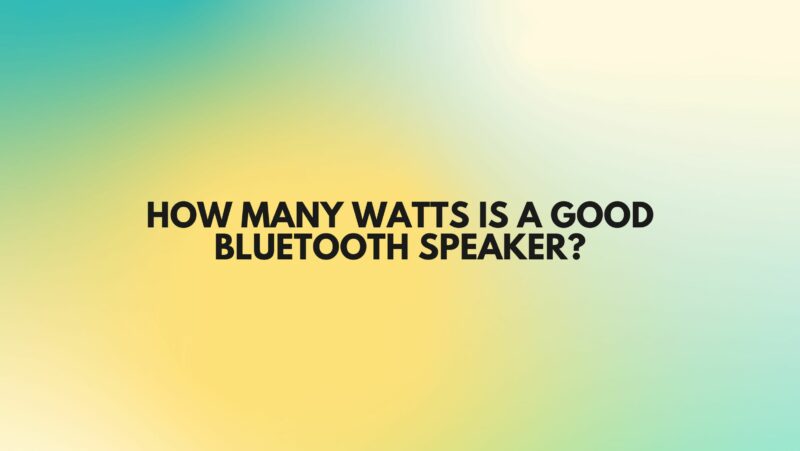Selecting the ideal Bluetooth speaker can be a daunting task, especially when considering factors like size, battery life, and, of course, wattage. But how many watts is a good Bluetooth speaker? The answer isn’t as straightforward as a single number, as it depends on your specific needs and usage scenarios. In this comprehensive article, we’ll explore the role of wattage in Bluetooth speakers, how it impacts sound quality and volume, and what considerations should guide your decision.
Understanding Wattage in Bluetooth Speakers
Wattage, measured in watts (W), indicates the power output of a Bluetooth speaker’s amplifier. It directly influences how loudly the speaker can play music. However, a higher wattage doesn’t necessarily mean better sound quality or suitability for all situations.
Factors Influencing Wattage Requirements
Before determining how many watts you need in a Bluetooth speaker, consider these key factors:
- Listening Environment: The size and acoustics of the room or outdoor space where you plan to use the speaker significantly affect the required wattage. Larger spaces generally demand more wattage for adequate sound coverage.
- Listening Volume: If you prefer listening at lower volumes, you won’t need as many watts to achieve satisfactory sound quality. Conversely, higher volumes necessitate more wattage for distortion-free playback.
- Speaker Efficiency: The sensitivity or efficiency of a speaker, often measured in decibels (dB), plays a crucial role. A more efficient speaker can produce higher volumes with less power. Look for sensitivity ratings when evaluating Bluetooth speakers.
Determining Wattage Requirements
To determine how many watts are suitable for your needs, follow these guidelines:
- Small Indoor Spaces: For small rooms, offices, or personal use, a Bluetooth speaker with 5 to 10 watts is often sufficient. These speakers can provide clear and enjoyable sound at moderate volumes.
- Medium Indoor Spaces: In medium-sized rooms, such as living rooms or bedrooms, opt for a Bluetooth speaker with 10 to 20 watts. This range should offer ample volume and fill the space with sound without distortion.
- Large Indoor Spaces: If you intend to use the speaker in a large living room, open-concept area, or for parties, consider a Bluetooth speaker with 20 to 50 watts or more. Higher wattage ensures the speaker can deliver room-filling sound with clarity even at high volumes.
- Outdoor Use: Outdoor environments require more power due to ambient noise and the need to project sound over a larger area. A rugged Bluetooth speaker with 20 to 50 watts or higher is advisable for outdoor use.
- Bass and Subwoofers: If you value deep bass and thumping low-end frequencies, consider a Bluetooth speaker with a built-in subwoofer or one that can be paired with an external subwoofer. These tend to have higher wattages to support low-frequency reproduction effectively.
Consider Other Features and Factors
While wattage is an essential consideration, it’s not the only factor that determines the quality and suitability of a Bluetooth speaker. Pay attention to:
- Sound Quality: Wattage alone doesn’t guarantee good sound quality. The speaker’s design, driver size, and audio processing capabilities play a significant role in overall sound performance.
- Battery Life: Consider how long the speaker can operate on a single charge, especially if you plan to use it in portable scenarios.
- Connectivity: Ensure the speaker is compatible with your devices and offers features like Bluetooth range and connectivity options (e.g., aux-in, USB, and NFC).
- Portability and Durability: Assess the speaker’s size, weight, and build quality to determine if it suits your intended usage, whether for travel, outdoor adventures, or home use.
Conclusion
Determining how many watts are suitable for a Bluetooth speaker depends on your specific requirements, such as the listening environment, desired volume levels, and intended use. While wattage is a critical factor, it’s just one piece of the puzzle. Consider the overall sound quality, speaker efficiency, and additional features to find the Bluetooth speaker that meets your needs and delivers a satisfying audio experience. Ultimately, the “right” wattage is the one that provides the volume and sound quality you desire for your unique listening scenarios.


